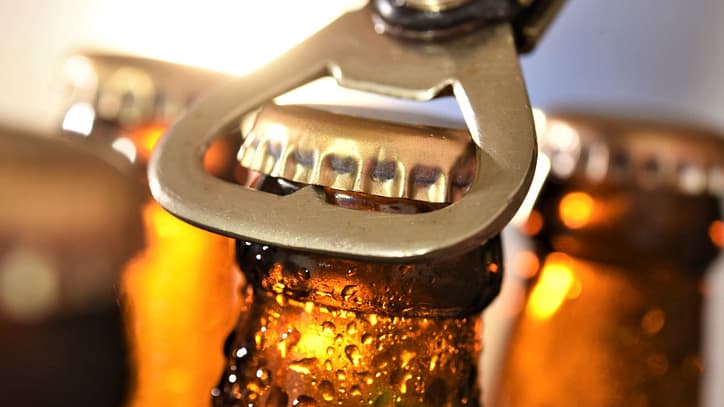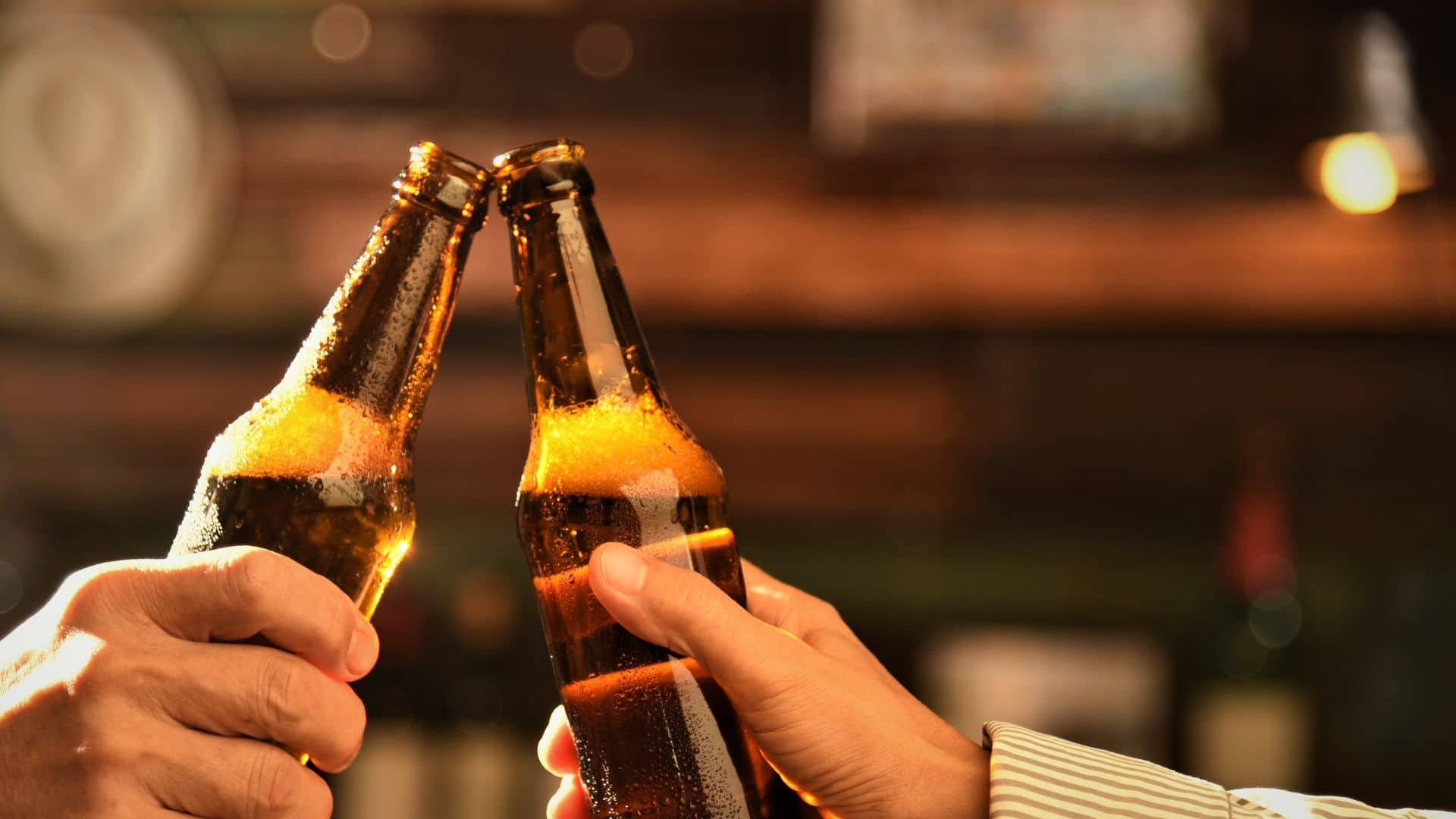Hey there, fitness enthusiasts! We’ve all heard the age-old debate: Is it okay to crack open a cold beer after hitting the gym or doing those challenging squats? It’s a question that’s sparked many conversations.
In this blog post, we’ll dive into the science and practicality of enjoying a brew post-workout.
So, whether you’re a gym regular or just curious, let’s explore whether that bottle of beer is a fitting reward for your sweat session or something better saved for later.”
Understanding whether drinking a bottle of beer “after doing squats” is good.
Although enjoying a beer occasionally is a personal choice, drinking a bottle of beer may not be the best practice immediately after doing squats or any strenuous exercise.
It’s very important to prioritize rehydration, nutrition, and rest to support your body’s recovery process effectively rinse and repeat to maintain good health.
Drinking a bottle of beer after doing squats is a topic that involves both physical fitness and alcohol consumption.
Let’s break it down here:
Physical Fitness and Squats: Squats are a compound exercise that primarily targets the muscles in your lower body, including your quadriceps, hamstrings, and glutes.
They are an excellent exercise for building strength, stability, and muscle mass in your legs and lower back.
After a strenuous workout like squats, your body may benefit from certain post-workout practices, such as:
-
- Rehydration: It’s essential to rehydrate after exercise, and water is usually the best choice. Beer, on the other hand, is an alcoholic beverage and can lead to dehydration, which is not ideal after a workout.
- Nutrition: Consuming a balanced meal or snack that includes carbohydrates and protein can help with muscle recovery. Beer does not provide the necessary nutrients for recovery.
- Rest: Rest and sleep are crucial for muscle repair and growth. Alcohol can interfere with sleep quality and disrupt your body’s recovery process.
Alcohol Consumption and Timing: If you choose to consume alcohol, it’s essential to do so responsibly and be aware of its effects on your body.
Consuming a bottle of beer immediately after a workout, especially a strenuous one like squats, may not be the best choice for several reasons:
-
- Dehydration: Alcohol is a diuretic, which means it can cause your body to lose fluids, potentially leading to dehydration.
- Nutrient Absorption: Alcohol can interfere with the absorption of essential nutrients, which can hinder your body’s ability to recover effectively after exercise.
- Sleep Disruption: Alcohol can disrupt your sleep patterns, making it harder for your body to recover during rest.
- Impaired Judgment and Coordination: Alcohol can impair your judgment and coordination, which can be dangerous if you’re still at the gym or planning to engage in other physical activities.
In other words, while enjoying a beer occasionally is a personal choice, it may not be the best practice immediately after doing squats or any strenuous exercise.
It’s important to prioritize rehydration, nutrition, and rest to support your body’s recovery process effectively.
If you choose to consume alcohol, it’s advisable to do so in moderation and at a time when it won’t interfere with your fitness goals or overall health.
Always consult with a healthcare professional or fitness expert for personalized advice.

Further Explanations.
Let’s dive deeper and explain further the point mentioned here.
First let’s break down the key points regarding physical fitness, squats, and post-workout practices in more detail:
1. Physical Fitness and Squats:
Squats are a compound exercise that engages multiple muscle groups, primarily targeting the muscles in your lower body, including the quadriceps (front thigh muscles), hamstrings (back thigh muscles), and glutes (buttocks).
They are considered one of the fundamental strength-training exercises and offer several benefits:
Strength Building:
Squats are effective for building strength in the lower body, which can enhance your overall physical fitness, help with everyday tasks, and improve athletic performance.
Stability:
Squats require core stability and balance, promoting better overall stability and reducing the risk of injury.
Muscle Mass:
Performing squats with sufficient resistance (such as weights or body weight) can stimulate muscle growth, particularly in the targeted muscle groups.
Post-Workout Practices After Squats:
After completing a strenuous workout like squats, it’s essential to follow specific post-workout practices to support your body’s recovery and maximize the benefits of your exercise routine.
Here are the key practices:
Rehydration:
During exercise, your body loses fluids through sweating. Rehydration is crucial to replace these lost fluids and maintain proper bodily functions.
Water is the best choice for rehydration because it is free from alcohol or other diuretics, which can lead to increased fluid loss.
Nutrition:
Consuming a balanced meal or snack after a workout is important for muscle recovery.
Your body requires carbohydrates to replenish glycogen stores (the body’s primary energy source during exercise) and protein to aid in muscle repair and growth.
Beer does not provide the necessary nutrients required for effective post-workout recovery.
Rest:
Rest and sleep are essential for muscle repair and growth.
During deep sleep, your body releases growth hormone, which plays a significant role in recovery.
Alcohol can disrupt sleep patterns, leading to poor-quality sleep and hindering the body’s natural recovery processes.
In essence , while squats are an excellent exercise for building strength and stability in the lower body, post-workout practices play a critical role in optimizing the benefits of your workout.
Rehydration with water, consuming a balanced meal for nutrition, and getting adequate rest are essential components of an effective post-workout routine.
Consuming alcohol, such as beer, immediately after a workout is generally not recommended, as it can lead to dehydration, provide empty calories, and disrupt the body’s recovery processes, including sleep.
It’s advisable to prioritize healthier options to support your fitness goals and overall well-being.
2. Alcohol Consumption and Timing:
L let’s delve deeper into the effects of alcohol consumption, especially immediately after a workout like squats:
1. Dehydration:
Alcohol is a diuretic, meaning it increases urine production and can lead to dehydration. After a strenuous workout like squats, your body is already in a state of dehydration due to sweating and increased fluid loss.
Consuming alcohol can exacerbate this dehydration, potentially leading to symptoms like dizziness, fatigue, and muscle cramps.
Dehydration can impair your body’s ability to recover effectively, as adequate hydration is essential for various physiological processes, including nutrient transport and temperature regulation.
2. Nutrient Absorption:
Alcohol can interfere with the absorption of essential nutrients in your digestive system.
After exercise, your body requires nutrients like carbohydrates and protein to replenish glycogen stores and support muscle recovery.
Alcohol can hinder the absorption of these nutrients, making it less efficient for your body to utilize the nutrients you consume post-workout.
This can slow down the recovery process and diminish the benefits of your workout.
3. Sleep Disruption:
Alcohol can disrupt sleep patterns and reduce the quality of your rest. While it may make you feel drowsy initially, it can lead to fragmented sleep and frequent awakenings during the night.
Deep sleep stages, which are crucial for muscle repair and growth, are often disrupted by alcohol consumption.
Poor-quality sleep can leave you feeling fatigued and less recovered the next day, negatively affecting your overall well-being and fitness progress.
4. Impaired Judgment and Coordination:
Alcohol impairs cognitive functions and motor skills, including judgment and coordination.
Consuming alcohol after a workout can be dangerous if you plan to continue physical activities, such as driving home from the gym or engaging in any other tasks that require focus and coordination.
It can increase the risk of accidents and injuries, which is counterproductive to your fitness goals.
In all this is the fact that consuming a bottle of beer immediately after a workout like squats is not advisable due to the potential negative effects on hydration, nutrient absorption, sleep quality, and cognitive function.
If you choose to consume alcohol, it’s essential to do so in moderation and at a time when it won’t interfere with your fitness and recovery goals.
Prioritizing proper post-workout nutrition, hydration, and rest will help you maximize the benefits of your exercise routine and support your overall health and fitness journey.
A concise tabular on this topic and compare
Here’s a concise tabular comparison of drinking a bottle of beer after doing squats, highlighting the pros and cons:
| Aspect | Drinking Beer After Squats | Not Drinking Beer After Squats |
|---|---|---|
| Hydration | Can lead to dehydration due to alcohol’s diuretic effect. | Water is a better choice for rehydration after exercise. |
| Nutrient Absorption | Alcohol may interfere with nutrient absorption. | Proper nutrition supports muscle recovery more effectively. |
| Sleep Quality | Can disrupt sleep patterns and reduce sleep quality. | Better sleep quality aids in muscle repair and growth. |
| Safety | Impairs judgment and coordination, increasing risks. | Ensures safety, especially if physical activities follow. |
In summary, drinking a bottle of beer after doing squats has potential drawbacks, including dehydration, nutrient absorption interference, disrupted sleep quality, and impaired safety.
Opting for better hydration, nutrition, and rest is generally recommended for effective post-workout recovery and overall well-being.
Conclusion.
In conclusion, drinking a bottle of beer immediately after doing squats is not an ideal choice for post-workout recovery.
It can lead to dehydration, hinder nutrient absorption, disrupt sleep quality, and impair safety. Prioritizing hydration, proper nutrition, and rest is a more effective approach to support muscle recovery and overall well-being after strenuous exercise.

Hey there, it’s Mike Rrsq, the Editor-in-Chief over at Jsquat.com, and I’m absolutely obsessed with all things squat fitness! I’ve been lucky enough to get some serious recognition for my work in this field. With a solid background in the fitness and wellness industry, I’ve been there right from the get-go, helping shape this website into what it is today.
You see, I’m not just the boss around here; I’m also a passionate contributor. I love sharing my insights through my articles, and trust me, they’re not your run-of-the-mill stuff. Each piece I write is a labor of love, filled with my expertise and real-world experience in the fitness universe. So, if you’re into fitness and looking for some inspiration, you’re in the right place!


